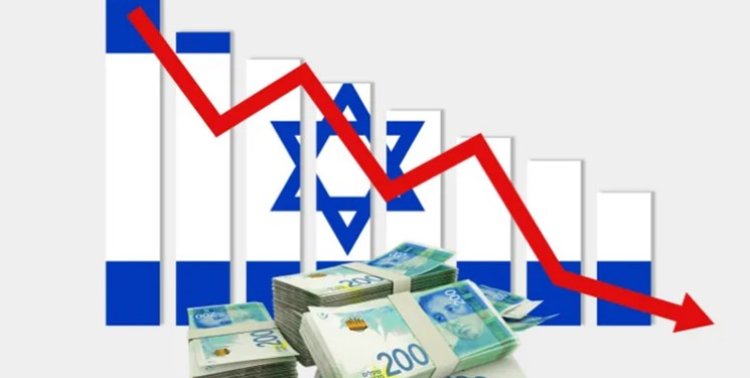“Heavy losses” on Israel economy in 2023

Israel is facing mounting economic losses as a result of the continuation of the war it is waging on the Gaza Strip following the Hamas attack on the 7th of last October, which affected production, tourism movement, and the pumping of natural gas abroad. These losses are expected to continue until the year 2024, causing serious economic repercussions.
Israel recorded a budget deficit of about 17 billion shekels (approximately 4.5 billion dollars) last November. According to what was announced by the Israeli Ministry of Finance.
Economic losses
Last month, Bank of Israel Governor Amir Yaron expected that economic losses would reach 10 percent of Israel’s gross domestic product, which is equivalent to $52 billion, indicating that the bank based its expectations on two assumptions:
- The first is that the impact of the war will continue until next year.
- The second is that it will be mostly on the Gaza front, without opening other fronts.
In the third quarter of 2023, the Israeli economy recorded slower growth than expected, according to data from the Israeli Central Bureau of Statistics, while growth is expected to decline sharply in the fourth quarter in light of the continuation of the war.
After growth of 6.5 percent in 2022, Israel's gross domestic product is expected to decline in the entire year 2023 to only about 2 percent, partly due to the negative impact of the war.
While growth in 2024 will depend on the duration of the war and the extent to which its scope expands to include other fronts or not, according to Reuters.
Speaking to Sky News Arabia, economic expert Abdul Nabi Abdul Muttalib confirms that:
Prolonging the war period will lead to huge losses in the Israeli economy.
During the first period of the war, the Israeli economy witnessed a set of extremely difficult indicators, including a decline in the value of the shekel by a rate ranging from 0.6 percent to 3 percent.

Economic pressures
American support reduces the extent of economic pressures, as Washington announced that it will provide support worth $10 billion to the Israelis. Which leads to an improvement in the economic situation in Israel, stopping the free fall of the shekel and alleviating the situation among those dealing with Israel, especially in Israeli stocks and in the financial market.
He adds: There were fears that the extension of the war might threaten the extraction and export of Israeli gas, and would also greatly negatively affect the Israeli population. Because a significant portion of the Israeli workforce was called up to the army.
He added that this also affects the structure of production inside Israel, and threatens to decline the Israeli gross domestic product to about 7 percent according to many estimates if the war continues.
He points out that the Israelis are currently trying to avoid this matter by laying off a group of reserve officers, especially since they work in the private professional sectors, including engineers, doctors, and production managers.

International shipping companies
He points out one of the effects associated with international shipping companies stopping navigation in the Red Sea, which often goes to Israel, because it arrives at the port of Haifa coming from Europe and from there via the Red Sea to India or East Asia or coming from East Asia to the port of Eilat, which... It raises insurance costs for Israeli shipments, and makes goods or insurance more expensive.
The Danish shipping company A.P. Moller-Maersk, one of the largest shipping companies in the world, announced the application of additional fees on goods imported from Israel, for reservations with a price calculation date starting from January 8, 2024; For emergency risks on all customer goods unloaded at the ports of Israel.
The Yemeni Houthi group intensified its attacks on ships in the Red Sea, in the context of a series of attacks launched by the Houthis on southern Israel in response to the war launched by Israel against the Hamas movement in the Gaza Strip.


 Shrouq
Shrouq 












